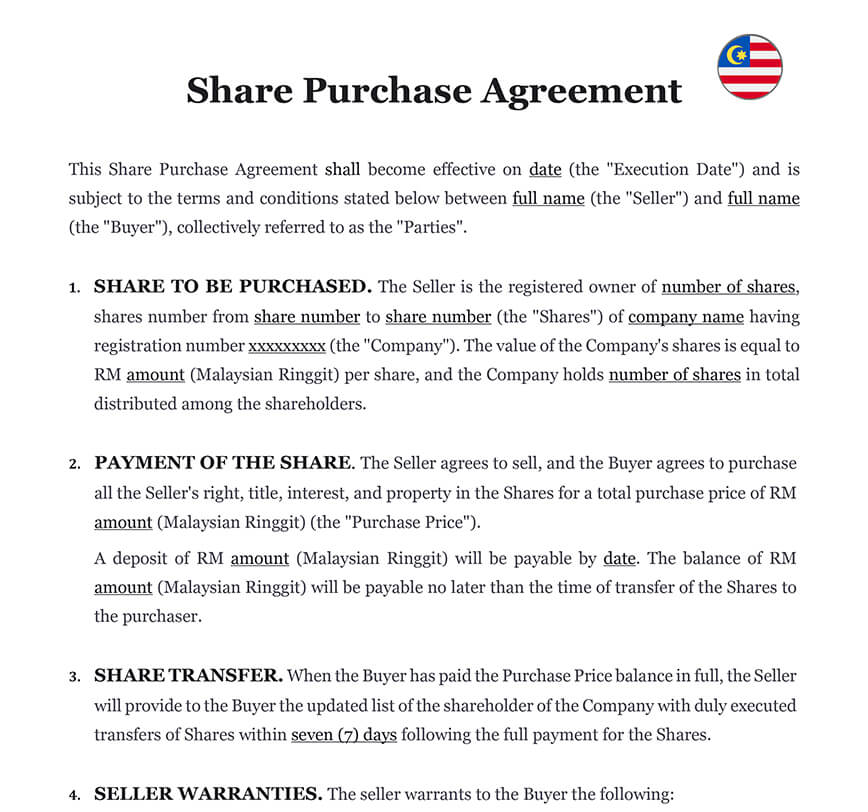Understanding Business Ownership Transfer in Malaysia
Business ownership transfer refers to the process of transferring the ownership of a business from one individual or entity to another in Malaysia. This can happen through the sale of the business, inheritance, or gifting. In Malaysia, there are several legal and regulatory requirements that must be met in order to transfer business ownership, including obtaining the necessary permits and licenses, complying with tax laws, and adhering to labor laws.
Types of Business Ownership Transfer
In Malaysia, there are several types of business ownership transfer that can take place.
| ➤ One of the most common ways to transfer ownership is through the sale of the business. This involves finding a buyer who is willing to purchase the company and negotiating a fair price. |
| ➤ Another option is to pass the business on to a family member, which can be done through a gift or a sale. |
| ➤ For those who wish to keep the business within the company, offering shares to employees can be a good option. This allows employees to become shareholders and take on a stake in the business. In order to do so, you may use a shareholder agreement. |
| ➤ Other options include merging with another company or undergoing a management buyout, where current employees purchase the company from the current owners. |
ℹ️ Each of these types of ownership transfer comes with its own set of legal and financial considerations, so you might want to seek professional advice with our lawyers to determine the best course of action for your business.
Legal Requirements to Transfer Business Ownership
There are several legal requirements that must be fulfilled when transferring business ownership in Malaysia.
First and foremost, the parties involved must draft and sign a Share Purchase Agreement, which outlines the terms and conditions of the transaction, including the purchase price, payment terms, and any warranties or representations made by the seller.
Additionally, the parties must obtain approval from the Companies Commission of Malaysia, which oversees the Company Registration and regulation of companies in the country. This involves filing the necessary documents and paying the requisite fees. Depending on the nature of the business, there may be additional regulatory requirements to consider, such as obtaining permits or licenses from relevant authorities.
Finally, both the buyer and seller must ensure that they comply with all relevant tax laws, including paying any applicable stamp duty and capital gains tax.
Step-by-Step Guide to Transferring Business Ownership
Transferring business ownership in Malaysia can be a complex process, but following a step-by-step guide can help to ensure a smooth and successful transaction.
1. The first step is to negotiate the terms of the sale and draft a share purchase agreement. By downloading our share purchase agreement you will ensure that it complies with Malaysian laws.
2. Next, a meeting should be held between the buyer and seller, during which the terms of the share purchase agreement should be discussed and agreed upon. Minutes of Meeting should be taken and signed by both parties.
3. The next step is to obtain approval from the Companies Commission of Malaysia, which involves filing the necessary documents and paying the requisite fees. Depending on the nature of the business, there may be additional regulatory requirements to consider, such as obtaining permits or licenses from relevant authorities.
4. Finally, both the buyer and seller must ensure that they comply with all relevant tax laws, including paying any applicable stamp duty and capital gains tax.
Common Mistakes to Avoid When Transferring Business Ownership
Transferring business ownership in Malaysia can be a complex and stressful process, and there are several common mistakes that should be avoided.
One of the most common mistakes is failing to engage the services of a qualified Company Secretary, who can provide invaluable guidance and support throughout the transfer process. Another mistake is failing to conduct proper due diligence on the business being acquired, which can lead to unforeseen liabilities and legal issues. Additionally, failing to properly document the transaction, including the terms of the share purchase agreement and minutes of any meetings held, can cause problems down the line. Finally, failing to comply with all relevant legal and regulatory requirements, including obtaining the necessary permits and licenses and complying with tax laws, can result in costly penalties and delays.
In conclusion, transferring business ownership in Malaysia can be a complex process, but with proper planning and execution, it can be a smooth transition. By following the guidelines we’ve provided, you can ensure compliance with legal requirements and avoid any potential issues that may arise during the transfer. With careful consideration and preparation, you can successfully transfer ownership of your business in Malaysia and set it up for continued success.











